Search Results for 'later'
-
AuthorSearch Results
-
February 9, 2026 at 10:51 pm #8057
In reply to: The Hoards of Sanctorum AD26
Perspicacious as she undoubtedly was, Mrs Fennel decisively turned on her heel and marched (as well as she could with her arthritic hip) out of the room with the tray of tea and Karstic Rock Cakes, and limped off in the direction of the kitchen. If they want tea and cakes, they can come to the kitchen. Mars F always kept her kitchen streamlined, orderly and uncluttered for maximum efficiency.
The retreating aroma of freshy baked muffins animated Spirius sufficiently for him to hasten after the refreshment laden maid of all work, and take the tray off her.
Mrs Fennel smirked, rubbing her hands on her apron as if to remove the jumbled derangement from her capable hands.
When Yvoise was perusing the transcription of the security and posterity camera recording later, prior to filing it, she noticed Mars F, and wondered. What could it mean?
January 4, 2026 at 6:59 pm #8029In reply to: The Hoards of Sanctorum AD26
“While you’re off to another wild dragon chase, I’m calling the plumber,” Yvoise announced. She’d found one who accepted payment in Roman denarii. She began tapping furiously on her smartphone to recover the phone number, incensed at having been blocked again from Faceterest for sharing potentially unchecked facts (ignorants! she wanted to shout at the screen).
 After a bit of struggle, the appointment was set. She adjusted her blazer; she had a ‘Health and Safety in the Workplace’ seminar to lead at Sanctus Training in twenty minutes, and she couldn’t smell like wet dog.
After a bit of struggle, the appointment was set. She adjusted her blazer; she had a ‘Health and Safety in the Workplace’ seminar to lead at Sanctus Training in twenty minutes, and she couldn’t smell like wet dog.“Make sure you bill it to the company account…!” Helier shouted over the noise Spirius was making huffing and struggling to load the antique musket.
“…under ‘Facility Maintenance’!”
“Obviously,” Yvoise scoffed. “We are a legitimate enterprise. Sanctus House has a reputation to uphold. Even if the landlord at Olympus Park keeps asking why our water consumption rivals a small water park.”
Spirius shuddered at the name. “Olympus Park. Pagan nonsense. I told you we should have bought the unit in St. Peter’s Industrial Estate.”
“The zoning laws were restrictive, Spirius,” Yvoise sighed. “Besides, ‘Sanctus Training Ltd’ looks excellent on a letterhead. Now, if you’ll excuse me, I have six junior executives coming in for a workshop on ‘Conflict Resolution.’ I plan to read them the entirety of the Treaty of Arras until they submit.”
“And dear old Boothroyd and I have a sewer dragon to exterminate in the name of all that’s Holy. Care to join, Helier?”
“Not really, had my share of those back in the day. I’ll help Yvoise with the plumbing. That’s more pressing. And might I remind you the dragon messing with the plumbing is only the first of the three tasks that Austreberthe placed in her will to be accomplished in the month following her demise…”
“Not now, Helier, I really need to get going!” Yvoise was feeling overwhelmed. “And where’s Cerenise? She could help with the second task. Finding the living descendants of the last named Austreberthe, was it? It’s all behind-desk type of stuff and doesn’t require her to get rid of anything…” she knew well Cerenise and her buttons.
“Yet.” Helier cut. “The third task may well be the toughest.”
“Don’t say it!” They all recoiled in horror.
“The No-ve-na of Cleans-ing” he said in a lugubrious voice.
“Damn it, Helier. You’re such a mood killer. Maybe better to look for a loophole for that one. We can’t just throw stuff away to make place for hers, as nice her tastes for floor tiling were.” Yvoise was in a rush to get to her appointment and couldn’t be bothered to enter a debate. She rushed to the front door.
“See you later… Helier-gator” snickered Laddie under her breath, as she was pretending to clean the unkempt cupboards.
January 3, 2026 at 8:09 pm #8025In reply to: The Hoards of Sanctorum AD26
As soon as Boothroyd had gone, Laddie Bentry, the under gardener, emerged from behind the Dicksonia squarrosa that was planted in a rare French Majolica Onnaing dragon eagle pot. The pot, and in particular the tree fern residing within it, were Laddie’s favourite specimen, reminding him of his homeland far away.
Keeping a cautious eye on the the door leading into the house, Laddie hurried over to the cast iron planter and retrieved the Liz Tattler novel hidden underneath. Quickly he tucked in into the inside pocket of his shabby tweed jacket and hastened to the door leading to the garden. Holding on to his cap, for the wind was cold and gusty, he ran to the old stable and darted inside. Laddie reckoned he had an hour or two free without Boothroyd hovering over him, and he settled himself on a heap of old sacks.
 The Vampire Hoarders of Varna. It wasn’t the first time Laddie had seen Boothroyd surreptitiously reading Helier’s books, and it had piqued his curiosity. What was it the old fart found so interesting about Helier’s novels? The library was full of books, if he wanted to read. Not bothering to read the preface, and not having time to start on page one, Laddie Bentry flicked through the book, pausing to read random passages.
The Vampire Hoarders of Varna. It wasn’t the first time Laddie had seen Boothroyd surreptitiously reading Helier’s books, and it had piqued his curiosity. What was it the old fart found so interesting about Helier’s novels? The library was full of books, if he wanted to read. Not bothering to read the preface, and not having time to start on page one, Laddie Bentry flicked through the book, pausing to read random passages.….the carriage rattled and lurched headlong through the valley, jostling the three occupants unmercifully. “I’ll have the guts of that coachman for garters! The devil take him!” Galfrey exclaimed, after bouncing his head off the door frame of the compartment.
“Is it bleeding?” asked Triviella, inadvertently licking her lips and she inspected his forehead.
“The devil take you too, for your impertinence,” Galfrey scowled and shook her off, his irritation enhanced by his alarm at the situation they found themselves in.
Ignoring his uncharacteristic bad humour, Triviella snuggled close and and stroked his manly thigh, clad in crimson silk breeches. “Just think about the banquet later,” she purred.
Jacobino, austere and taciturn, on the opposite seat, who had thus far been studiously ignoring both of them, heard the mention of the banquet and smiled for the first time since…
Laddie opened the book to another passage.
“……1631, just before the siege of Gloucester, and what a feast it was! It was hard to imagine a time when we’d feasted so well. Such rich and easy pickings and such a delightful cocktail. One can never really predict a perfect cocktail of blood types at a party, and centuries pass between particularly memorable ones. Another is long overdue, and one would hate to miss it,” Jacobino explained to the innocent and trusting young dairy maid, who was in awe that the handsome young gentleman was talking to her at all, yet understood very little of his dialogue.
“Which is why,” Jacobino implored, taking hold of her small calloused hands, “You must come with me to the banquet tonight.”
Little did she know that her soft rosy throat was on the menu…..
December 31, 2025 at 9:45 pm #8020In reply to: The Hoards of Sanctorum AD26
Spirius was looking decidedly ill at ease, which struck Cerenise as far from unusual, and as such, struck her not at all at the time. It wasn’t until later that she became aware of the cause of the discomfiture of her centuries old companion. Spirius had always been a bit of a dark horse, although that wasn’t really the right expression. A character of hidden depths and mysteries, perhaps with a penchant for bottling things up and labeling them,and then shelving them. Nobody knew for sure. A good kind well meaning saint, as saints go. She smiled at him fondly.
I hope they’re recording this will reading, Cerenise thought again, not having been listening to the seemingly endless drone of items.
December 31, 2025 at 8:43 pm #8019In reply to: The Hoards of Sanctorum AD26
Yvoise gaze was transfixed on the brittle yellow document held reverently in the old barristers hands. Her eyes widened when she saw the pile of similar written sheets on the desk. I simply must have them, she thought, I simply must. What an addition to my collection of written records! Unique document, absolutely unique. Listen to old Bart, she admonished herself, and with an effort she focused on the old barristers reading of the will.
Cerenise had noticed Yvoise practically drooling over the written paper type matter, and suppressed a grin (in consideration of the occasion), and smiled fondly at the saint she’d known for so very long. Such a confident capable character, despite her private mysteries. As saints go, she’s been a good one really. And as the holy mother of all saints surely knows, the organisers above all should be revered, for where would be be without them. Amen.
I hope this is being recorded so I can watch it later, Yvoise and Cerenise simultaneously thought, Because I haven’t paid attention to Bartholomew since my mind started wandering.
July 16, 2025 at 6:06 am #7969In reply to: The Elusive Samuel Housley and Other Family Stories
Gatacre Hall and The Old Book
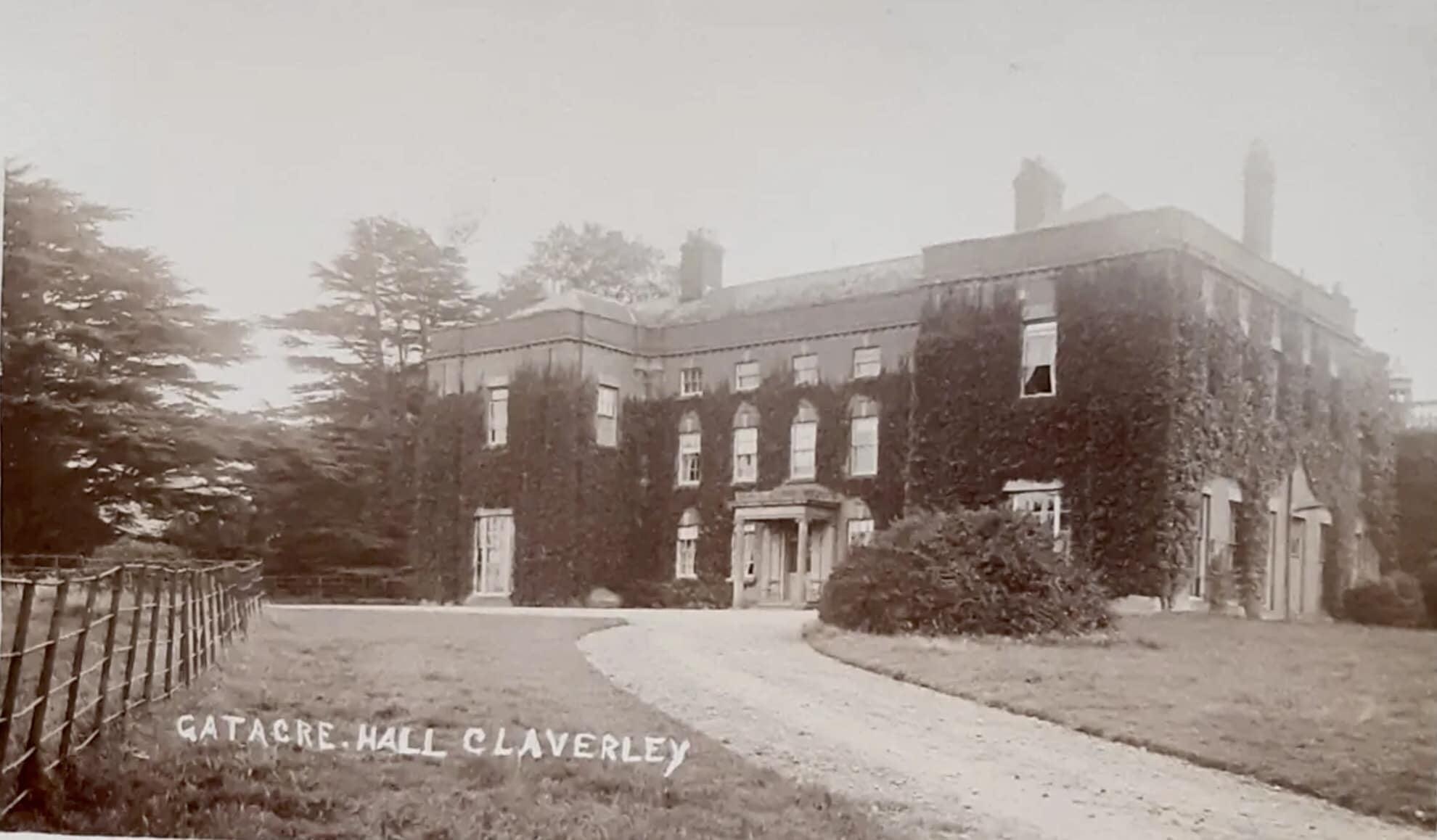
In the early 1950s my uncle John and his friend, possibly John Clare, ventured into an abandoned old house while out walking in Shropshire. He (or his friend) saved an old book from the vandalised dereliction and took it home. Somehow my mother ended up with the book.

I remember that we had the book when we were living in USA, and that my mother said that John didn’t want the book in his house. He had said the abandoned hall had been spooky. The book was heavy and thick with a hard cover. I recall it was a “magazine” which seemed odd to me at the time; a compendium of information. I seem to recall the date 1553, but also recall that it was during the reign of Henry VIII. No doubt one of those recollections is wrong, probably the date. It was written in English, and had illustrations, presumably woodcuts.
I found out a few years ago that my mother had sold the book some years before. Had I known she was going to sell it, I’d have first asked her not to, and then at least made a note of the name of it, and taken photographs of it. It seems that she sold the book in Connecticut, USA, probably in the 1980’s.
My cousin and I were talking about the book and the story. We decided to try and find out which abandoned house it was although we didn’t have much to go on: it was in Shropshire, it was in a state of abandoned dereliction in the early 50s, and it contained antiquarian books.
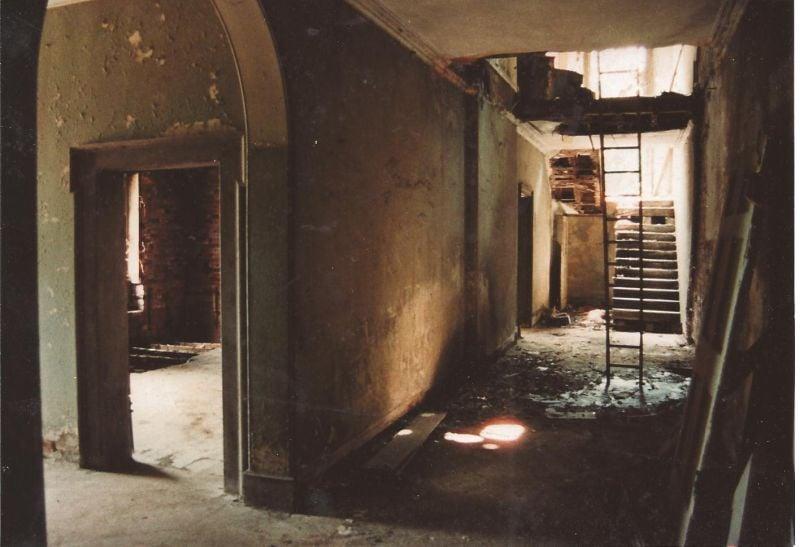
I posted the story on a Shropshire History and Nostalgia facebook group, and almost immediately had a reply from someone whose husband remembered such a place with ancient books and manuscripts all over the floor, and the place was called Gatacre Hall in Claverley, near Bridgnorth. She also said that there was a story that the family had fled to Canada just after WWII, even leaving the dishes on the table.
The Gatacre family sailing to Canada in 1947:
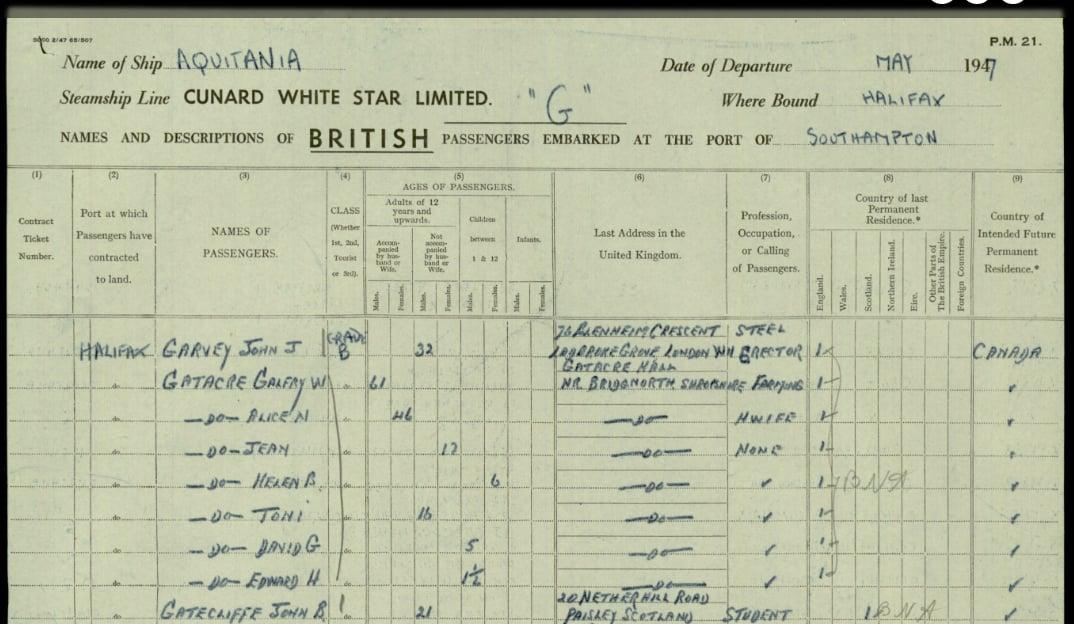
When my cousin heard the name Gatacre Hall she remembered that was the name of the place where her father had found the book.
I looked into Gatacre Hall online, in the newspaper archives, the usual genealogy sites and google books searches and so on. The estate had been going downhill with debts for some years. The old squire died in 1911, and his eldest son died in 1916 at the Somme. Another son, Galfrey Gatacre, was already farming in BC, Canada. He was unable to sell Gatacre Hall because of an entail, so he closed the house up. Between 1945-1947 some important pieces of furniture were auctioned, and the rest appears to have been left in the empty house.
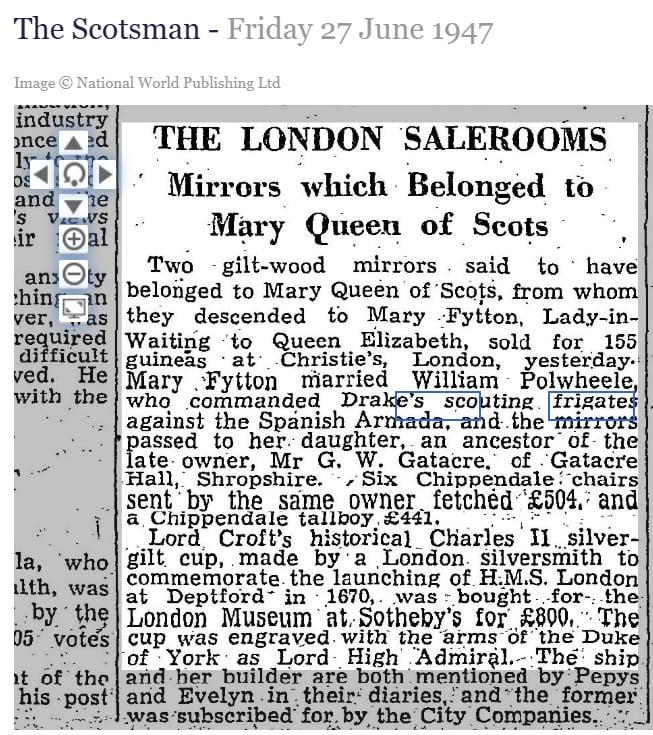
The family didn’t suddenly flee to Canada leaving the dishes on the table, although it was true that the family were living in Canada.
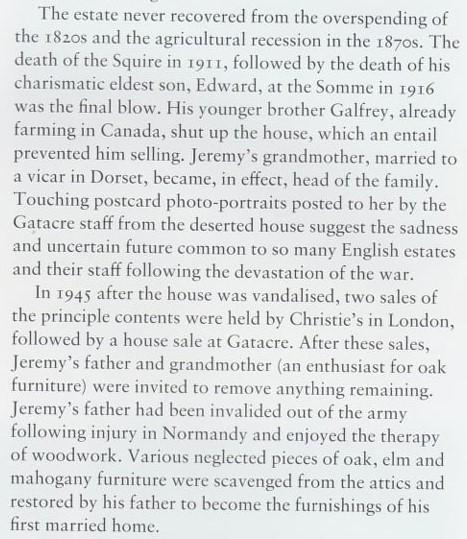
An interesting thing to note here is that not long after this book was found, my parents moved to BC Canada (where I was born), and a year later my uncle moved to Toronto (where he met his wife).
Captain Gatacre in 1918:
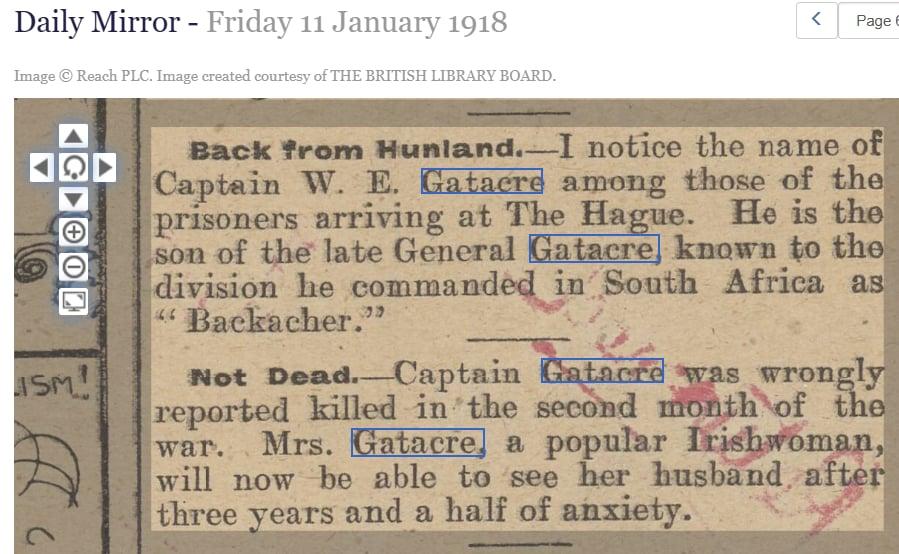
The Gatacre library was mentioned in the auction notes of a particular antiquarian book:
“Provenance: Contemporary ownership inscription and textual annotations of Thomas Gatacre (1533-1593). A younger son of William Gatacre of Gatacre Hall in Shropshire, he studied at the English college at the University of Leuven, where he rejected his Catholic roots and embraced evangelical Protestantism. He studied for eleven years at Oxford, and four years at Magdalene, Cambridge. In 1568 he was ordained deacon and priest by Bishop of London Edmund Grindal, and became domestic chaplain to Robert Dudley, 1st Earl of Leicester and was later collated to the rectory of St Edmund’s, Lombard Street. His scholarly annotations here reference other classical authors including Plato and Plutarch. His extensive library was mentioned in his will.”
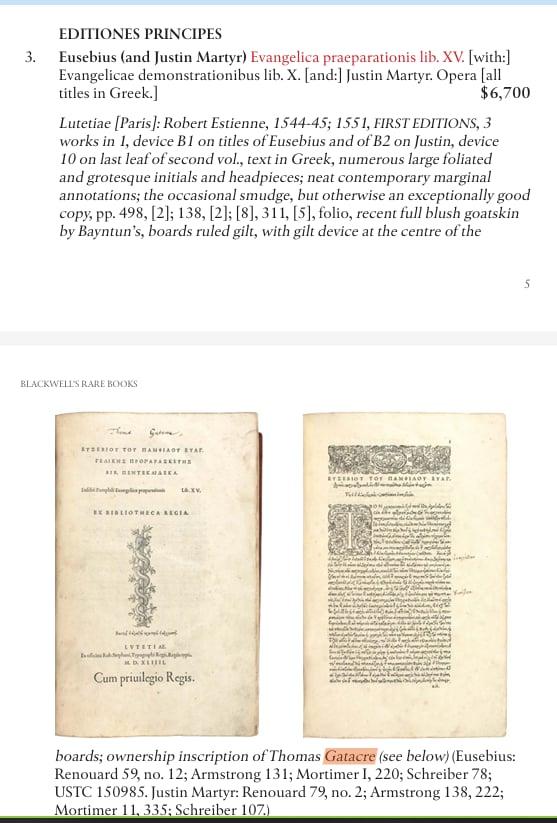
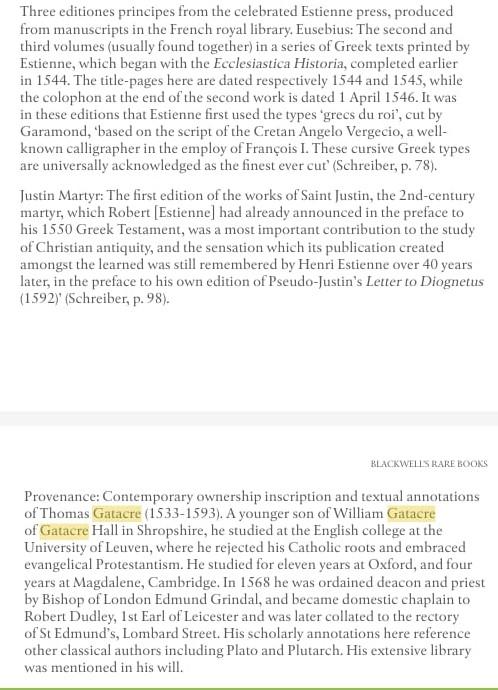
There are thirty four pages in this 1662 book about Thomas Gatacre d 1654:

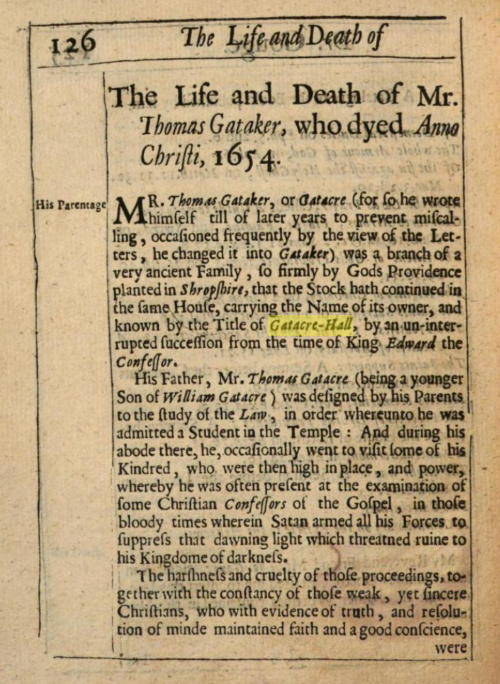 June 11, 2025 at 6:26 pm #7961
June 11, 2025 at 6:26 pm #7961In reply to: Cofficionados Bandits (vs Lucid Dreamers)
Amy rushed over to Kit when she saw what had happened and said, “Kit, give me your hat!”
Tentatively Kit put his hand on his head and sure enough he felt a hat upon it. Carefully he removed it and wonderingly gazed at the cowboy hat. He loved it! Just looking at the hat was already giving him ideas for his character, newly baked memories were starting to slide in like a tray of chocolate chip cookies on a baking sheet, pulled out of the oven at the perfect golden melting moment.
But Amy wants it! I can’t say no to her, but I want to keep it. It’s my first hat! Kit was close to tears.
“Oh poppet,” Amy said kindly when she noticed his face. Giving him a quick hug she explained. “I only want to borrow it, just to keep the Padre happy. He keeps asking where his hat is. I’ll bring it back as soon as we’ve settled him back at home.”
The releif was immense, and he graciously surrendered the hat to Aunt Amy. “Did you call me Poppet?” he asked. “Because Thiram just called me Trevor.”
“To me, you’ll always be Kit,” Amy said as she rushed back to her father. “See you later, Poppet!” she called over her shoulder.
“What does that mean?” asked Kit, but Amy had gone.
May 10, 2025 at 7:51 am #7920In reply to: Cofficionados – What’s Brewing
Key Characters (with brief descriptions)
Amy Kawanhouse – Self-aware new character with metatextual commentary. Witty, possibly insecure, reflective; has a goat named Fanella and possibly another, Finnley, for emergencies. Often the first to point out logical inconsistencies or existential quirks.
Carob Latte – Tall, dry-humored, and slightly chaotic. Fond of coffee-related wordplay and appears to enjoy needling Amy. Described as having “frizzled” hair and reverse-lucid dreams.
Thiram Izu – The practical one, technologically inclined but confused by dreams. Tends to get frustrated with the group’s lack of coordination. Has a history of tension with Amy, and a tendency to “zone out.”
Chico Ray – Mysterious newcomer. May have appeared out of nowhere. Unclear loyalties. Possibly former friend or frenemy of the group, annoyed by past incidents.
Juan & Dolores Valdez – Fictional coffee icons reluctantly acknowledging their existence within a meta-reality. Dolores isn’t ready to be real, and Juan’s fine with playing the part when needed.
Godric – Swedish barista-channeler. Hints at deeper magical realism; references Draugaskalds (ghost-singers) and senses strange presences.
Ricardo – Appears later. Described in detail by Amy (linen suit, Panama hat), acts as a foil in a discussion about maps and coffee geography. Undercover for a mission with Miss Bossy.
The Padre – Could be a father or a Father. Offstage, but influential. Concerned about rain ruining crops. A source of exposition and concern.
Fanella – Amy’s cream goat, serves as comic relief and visual anchor.
Finnley, the unpredictable goat, is reserved for “life or death situations.”May 5, 2025 at 5:55 pm #7915In reply to: Cofficionados Bandits (vs Lucid Dreamers)
Amy supposed everyone was blaming her, for what she couldn’t say, but they had clearly been avoiding her. There was plenty of coffee here anyway, even if the rest of the world was suffering. Don’t even think it, she told herself sternly. We don’t want people flocking here in droves once they realise.
So, do I want people or not? she asked herself. One minute I’m wondering where everyone is, and then next minute I’m wanting everyone to stay away.
“You on the spectrum too, are you?” asked Carob, reading her mind. “It’s ok,” she added, seeing the look of alarm cross Amy’s face, “Your secret’s safe with me. I mean about being on the spectrum. But be careful, they’re rounding people like us up and sending them to a correctional facility. We’re quite lucky to be here, out of the way.”
“Have you been avoiding me?” Amy asked, which was more immediately concerning than the concentration camps. “Because I’ve been here all alone for ages, nothing to do but read my book, draw in my sketch pad, and work on my needlepoint cushion covers. And where are the others? And don’t read my mind, it’s so rude.”
“Needlepoint cushion covers? Are you serious?” Carob was avoiding the questions, but was genuinely curious about the cushion covers.
Amy blushed. “No, I made that up. In fact, I don’t know what made me say that. I haven’t started any sketching either, but I have thought about starting sketching. And I’ve been reading. It’s an old Liz Tattler; the old ones were the best. Real old school Lizzie Tattie, if you know what I mean. Risque romps with potting sheds and stuff. None of that ghastly sci fi she started writing recently.”
“Which one?” Carob asked, and laughed when Amy held it up. “I read that years ago, T’Eggy Gets a Good Rogering, can I borrow it after you? God knows we could all do with a laugh.”
“How do you know the others need a good laugh?” Amy asked, peering at Carob with an attentive squint in order to catch any clues. “You’ve seen then, then?”
Carob smiled sadly and replied, “Only by remote viewing them.”
Amy asked where they had been and what they were doing when they were viewed remotely. Has she been remote viewing me? What if they ask her if she’s been remote viewing me, and she tells them? “Oh never mind,” Amy said quickly, “No need to answer that.”
Carob snorted, and what a strangely welcome sound it was. “I didn’t really remote view them, I made that up. It never works if I try to spy on people. Fat lot of good it is really, it never works when I really really need to see something. Or maybe it works, but I never believe it properly until later when I find out it was right.”
“Yeah,” Amy said, “It’s fun though, I haven’t done it in ages.”
“You should, it would give you something to do when everyone’s avoiding you.”
April 27, 2025 at 7:40 am #7908In reply to: Cofficionados Bandits (vs Lucid Dreamers)
“Look, don’t get upset, ok?” Amy felt she had to nip this in the bud. “There’s something glaringly wrong with the map. I mean, yes, it does make a nice picture. A very nice picture,” she added, and then stopped. Does it really matter? she asked herself. Am I always causing trouble?
Amy sighed. Would life be easier for everyone if she stopped pointing things out and just went along with things? Was there any stopping it anyway? It’s like a runaway train.
“You were saying?” Ricardo asked.
“Pray, continue,” added Carob with a mischeivous gleam in her eye. She knew where this was leading.
“Who is he?” Amy whispered to Carob. “Well never mind that now, you can tell me later.”
Amy cleared her throat and faced Ricardo (noting that he was dark complexioned and and of medium height and wiry build, dressed in a crumpled off white linen suit and a battered Panama hat, and likely to be of Latino heritage) noticing out of the corner of her eye a smirk on Thiram’s face who was leaning against a tree with his arms folded, looking as if he might start whistling Yankee Doodle any moment.
“According to your map, my good man, nice map that it is, in fact it’s so nice one could make a flag out of it, the colours are great and….” Amy realised she was waffling. She cleared her throat and braced her shoulders, glaring at Carob over her shoulder who had started to titter.
Speak your mind even if your voice shakes, and keep the waffling to a minimum.
“My dear Ricardo,” Amy began again, pushing her long light brown hair out of her sweaty hazel eyes, and pushing the sleeves of her old grey sweatshirt up over her elbows and glancing down at her short thin but shapely denim clad legs. “My dear man, as you can see I’m a slightly underweight middle aged woman eminently capable of trudging up and down coffee growing mountains, with a particular flair for maps, and this map of yours begs a few questions.”
“Coffee beans don’t grow in Florida,” Carob interjected, in an attempt to move the discourse along.
“Nor in Morocco,” added Amy quickly, shooting a grateful glance at Carob.
March 23, 2025 at 10:50 am #7880In reply to: The Precious Life and Rambles of Liz Tattler
“Nice arse,” said Idle non too quietly, admiring Roberto as he stacked firewood beside the hearth. The gardener glanced round and gave her a cheeky wink. He’d noticed her leaning out of an upstairs window watching him weeding the herbacious border.
“Now, now, Idle, no molesting the staff. I’ll write some men into the story for you later,” Liz said, “But first let’s talk about my new book. I’m wondering what to name the six spinsters. Some kind of a theme. Cerise, Fuschia, Scarlett, Coral, Rose and Magenta?”
“What about Cobalt, Lapis, Cerulean, Indigo, Sapphire and Capri?” offered Idle, topping up their wine glasses. “Chartreuse, Emerald, Jade, Fern, Pistachio and Malachite? Marigold, Saffron, Citron, Amber, Maize and Apricot?”
“How about Bratwurst, Chorizo, Salami, Knackwurst, Bologna and Frankfurter?” suggested Godfrey who was still miffed about all the spare parts being disposed of. “Lasagne, Macaroni, Canneloni, Farfali, Linguini and Ravioli?”
Roberto lit the fire and stood up. “I have an idea, you can call them Trowel, Rake, Hoe, Wheelbarrow, Spade and Secateur.”
“Marvelous Roberto, I love it!” gushed Aunt Idle.
“You’re all mad as a box of frogs, madder than Almad,” Finnley said. “How about Duster, Mop, Bleach, Broom, Dustpan and Cloth?”
“I think this incessant rain is driving us all mad,” Liz said, glancing out of the French windows with a sigh.
March 23, 2025 at 10:18 am #7879In reply to: The Precious Life and Rambles of Liz Tattler
Moments later, Finnley returned. “There’s a woman at the door. With suitcases. Says you invited her to stay. Nobody told me you were expecting guests.”
“Did you ask who it was?”
“Don’t you know who you invited? She’s a thin woman with awful dreadlocks, too old for dreads if you ask me, speaks with an Australian accent.”
“Ah yes, one of my favourite story characters! She’s come to help me with my new novel.”
“But what about the bedding? Nobody told me to get a bedroom ready for guests,” Finnley replied.
Just then a pretty young French maid appeared through the French windows. “I ‘ave come to ‘elp wiz ze bedding!”
“Fanella, right on cue! Come in dear, and go and help Finnley ~ Finnley, have you shown Aunt Idle in? Take her to the drawing room and I’ll be in directly, then go and help Fanella. And if you’re not careful, I may give Fanella your job, at least she’s willing and doesn’t complain all the time. And take that silly orange mask off, you look a fright.”
March 22, 2025 at 3:38 pm #7877In reply to: The Last Cruise of Helix 25
Helix 25 — The Six Spinster Sisters’ Will
Evie keyed in her login credentials for the sixth time that afternoon, stifling a yawn. Ever since the murder case had wrapped, she had drifted into a lulling routine—one that made her pregnancy drag on with excruciating slowness. Riven was rarely around; he’d been commandeered by the newly awakened Veranassessee for “urgent duties” that somehow never needed Evie’s help. And though she couldn’t complain about the ship’s overall calm, she felt herself itching for something—anything—to break the monotony.
So she’d come to one of the less-frequented data terminals on Helix25, in a dim corner off the main library deck. She had told herself she was looking up baby name etymologies (her mother would have pressed her about it), but she’d quickly meandered into clinically sterile subfolders of genealogical records.
It was exactly the kind of aimless rummaging that had once led her to uncover critical leads during the murder investigation. And if there was something Helix25 had in abundance besides well-recycled air, it was obscure digital archives.
She settled into the creaking seat, adjusting the small pillow behind her back. The screen glowed, lines of text scrolling by in neat greenish typeface. Most references were unremarkable: old Earth deeds, ledgers for farmland, family names she didn’t recognize. Had she not known that data storage was near infinite, due to the excess demands of data from the central AIs, she would have wondered why they’d bothered stocking the ship with so much information. Then her gaze snagged on a curious subfolder titled “Alstonefield Will—Gibbs Sisters.”
“Gibbs Sisters…?” she murmured under her breath, tapping it open.
The file contained scans of a handwritten will dated early 1800s, from Staffordshire, England. Each page was peppered with archaic legalese (“whereupon the rightful property of Misses Mary, Ellen, Ann, Sarah, Margaret and Malové Gibbs bequeathed…”), listing items that ranged from modest farmland acreage to improbable references of “spiritual confidences.”
Evie frowned, leaning closer. Spiritual confidences? The text was surprisingly explicit about the sisters’ lives—how six women jointly farmed 146 acres, remained unmarried, and according to a marginal note, “were rumored to share an uncanny attunement of thought.”
A telepathic link? she thought, half-intrigued, half-smirking. That smacked of the same kind of rumor-laden gossip that had swirled around the old Earth families. Still, the note was written in an official hand.
She scrolled further, expecting the record to fizzle out. Instead, it abruptly jumped to an addendum dated decades later:
“By 1834, the Gibbs sisters departed for the Australian continent. Certain seeds and rootstocks—believed essential for their ‘ancestral devotions’—did accompany them. No further official records on them remain in Staffordshire….”
Seeds and rootstocks. Evie’s curiosity piqued further—some old detail about hush-hush crops that the sisters apparently treasured enough to haul across the world.
A flicker of movement caught her eye. Trevor Pee “TP” Marshall, her faithful investigative hologram, materialized at the edge of her console. He adjusted his little pixelated bow tie, voice brimming with delight.
“Ah, I see you’re poking around genealogical conundrums, dear Evie. Dare I hope we’ve found ourselves another puzzle?”
Evie snorted softly. “Don’t get too excited, TP. It’s just a random will. But it does mention unusual circumstances… something about telepathy, special seeds, and these six spinster sisters traveling to the outback. It’s bizarre. And I’m bored.”
TP’s mustache twitched in faux indignation. “Bizarre is my lifeblood, my dear. Let’s see: six sisters of reputed synergy… farmland… seeds with rumored ‘power’… Honestly, that’s more suspicious than the standard genealogical yawn.”
Evie tapped a fingertip on the screen, highlighting the references. “Agreed. And for some reason, the file is cross-referenced with older Helix25 ‘implied passenger diaries.’ I can’t open them—some access restriction. Maybe Dr. Arorangi tagged them?”
TP’s eyes gleamed. “Interesting, indeed. You recall Dr. Arorangi’s rumored fascination with nonstandard genetic lines—”
“Right,” Evie said thoughtfully, sitting back. “So is that the link? Maybe this Alstonefield Hall story or the seeds the sisters carried has some significance to the architectural codes Arorangi left behind. We never did figure out why the AI has so many subroutines locked.”
She paused, glancing down at her growing belly with a wry smile. “I know it might be nothing, but… it’s a better pastime than waiting for Riven to show up from another Veranassessee briefing. If these old records are tied to Dr. Arorangi’s restricted logs, that alone is reason enough to dig deeper.”
TP beamed. “Spoken like a true detective. Ready to run with a half-thread of clue and see where it leads?”
Evie nodded, tapping the old text to copy it into her personal device. “I am. Let’s see who these Gibbs sisters really were… and why Helix25’s archives bothered to keep them in the system.”
Her heart thumped pleasantly at the prospect of unraveling some long-lost secret. It wasn’t exactly the adrenaline rush of a murder investigation, but in these humdrum days—six months after the last major crisis—it might be the spark she needed.
She rose from the console, smartphone in hand, and beckoned to the flickering detective avatar. “Come on, TP. Let’s find out if six mysterious spinsters from 1800s Staffordshire can liven things up for us.”
March 22, 2025 at 9:16 am #7873In reply to: The Last Cruise of Helix 25
March 15, 2025 at 11:16 pm #7869In reply to: The Last Cruise of Helix 25
Helix 25 – The Mad Heir
The Wellness Deck was one of the few places untouched by the ship’s collective lunar madness—if one ignored the ambient aroma of algae wraps and rehydrated lavender oil. Soft music played in the background, a soothing contrast to the underlying horror that was about to unfold.
Peryton Price, or Perry as he was known to his patients, took a deep breath. He had spent years here, massaging stress from the shoulders of the ship’s weary, smoothing out wrinkles with oxygenated facials, pressing detoxifying seaweed against fine lines. He was, by all accounts, a model spa technician.
And yet—
His hands were shaking.
Inside his skull, another voice whispered. Urging. Prodding. It wasn’t his voice, and that terrified him.
“A little procedure, Perry. Just a little one. A mild improvement. A small tweak—in the name of progress!”
He clenched his jaw. No. No, no, no. He wouldn’t—
“You were so good with the first one, lad. What harm was it? Just a simple extraction! We used to do it all the time back in my day—what do you think the humors were for?”
Perry squeezed his eyes shut. His reflection stared back at him from the hydrotherapeutic mirror, but it wasn’t his face he saw. The shadow of a gaunt, beady-eyed man lingered behind his pupils, a visage that he had never seen before and yet… he knew.
Bronkelhampton. The Mad Doctor of Tikfijikoo.
He was the closest voice, but it was triggering even older ones, from much further down in time. Madness was running in the family. He’d thought he could escape the curse.
“Just imagine the breakthroughs, my dear boy. If you could only commit fully. Why, we could even work on the elders! The preserved ones! You have so many willing patients, Perry! We had so much success with the tardigrade preservation already.”
A high-pitched giggle cut through his spiraling thoughts.
“Oh, heavens, dear boy, this steam is divine. We need to get one of these back in Quadrant B,” Gloria said, reclining in the spa pool. “Sha, can’t you requisition one? You were a ship steward once.”
Sha scoffed. “Sweetheart, I once tried requisitioning extra towels and ended up with twelve crates of anti-bacterial foot powder.”
Mavis clicked her tongue. “Honestly, men are so incompetent. Perry, dear, you wouldn’t happen to know how to requisition a spa unit, would you?”
Perry blinked. His mind was slipping. The whisper of his ancestor had begun to press at the edges of his control.
“Tsk. They’re practically begging you, Perry. Just a little procedure. A minor adjustment.”
Sha, Gloria, and Mavis watched in bemusement as Perry’s eye twitched.
“…Dear?” Mavis prompted, adjusting the cucumber slice over her eye. “You’re staring again.”
Perry snapped back. He swallowed. “I… I was just thinking.”
“That’s a terrible idea,” Gloria muttered.
“Thinking about what?” Sha pressed.
Perry’s hand tightened around the pulse-massager in his grip. His fingers were pale.
“Scalpel, Perry. You remember the scalpel, don’t you?”
He staggered back from the trio of floating retirees. The pulse-massager trembled in his grip. No, no, no. He wouldn’t.
And yet, his fingers moved.
Sha, Gloria, and Mavis were still bickering about requisition forms when Perry let out a strained whimper.
“RUN,” he choked out.
The trio blinked at him in lazy confusion.
“…Pardon?”
That was at this moment that the doors slid open in a anti-climatic whiz.

Evie knew they were close. Amara had narrowed the genetic matches down, and the final name had led them here.
“Okay, let’s be clear,” Evie muttered as they sprinted down the corridors. “A possessed spa therapist was not on my bingo card for this murder case.”
TP, jogging alongside, huffed indignantly. “I must protest. The signs were all there if you knew how to look! Historical reenactments, genetic triggers, eerie possession tropes! But did anyone listen to me? No!”
Riven was already ahead of them, his stride easy and efficient. “Less talking, more stopping the maniac, yeah?”
They skidded into the spa just in time to see Perry lurch forward—
And Riven tackled him hard.
The pulse-massager skidded across the floor. Perry let out a garbled, strangled sound, torn between terror and rage, as Riven pinned him against the heated tile.
Evie, catching her breath, leveled her stun-gun at Perry’s shaking form. “Okay, Perry. You’re gonna explain this. Right now.”
Perry gasped, eyes wild. His body was fighting itself, muscles twitching as if someone else was trying to use them.
“…It wasn’t me,” he croaked. “It was them! It was him.”
Gloria, still lounging in the spa, raised a hand. “Who exactly?”
Perry’s lips trembled. “Ancestors. Mostly my grandfather. *Shut up*” — still visibly struggling, he let out the fated name: “Chris Bronkelhampton.”
Sha spat out her cucumber slice. “Oh, hell no.”
Gloria sat up straighter. “Oh, I remember that nutter! We practically hand-delivered him to justice!”
“Didn’t we, though?” Mavis muttered. “Are we sure we did?”
Perry whimpered. “I didn’t want to do it. *Shut up, stupid boy!* —No! I won’t—!” Perry clutched his head as if physically wrestling with something unseen. “They’re inside me. He’s inside me. He played our ancestor like a fiddle, filled his eyes with delusions of devilry, made him see Ethan as sorcerer—Mandrake as an omen—”
His breath hitched as his fingers twitched in futile rebellion. “And then they let him in.“
Evie shared a quick look with TP. That matched Amara’s findings. Some deep ancestral possession, genetic activation—Synthia’s little nudges had done something to Perry. Through food dispenser maybe? After all, Synthia had access to almost everything. Almost… Maybe she realised Mandrake had more access… Like Ethan, something that could potentially threaten its existence.
The AI had played him like a pawn.
“What did he make you do, Perry?” Evie pressed, stepping closer.
Perry shuddered. “Screens flickering, they made me see things. He, they made me think—” His breath hitched. “—that Ethan was… dangerous. *Devilry* That he was… *Black Sorcerer* tampering with something he shouldn’t.”
Evie’s stomach sank. “Tampering with what?”
Perry swallowed thickly. “I don’t know”
Mandrake had slid in unnoticed, not missing a second of the revelations. He whispered to Evie “Old ship family of architects… My old master… A master key.”
Evie knew to keep silent. Was Synthia going to let them go? She didn’t have time to finish her thoughts.
Synthia’s voice made itself heard —sending some communiqués through the various channels
“The threat has been contained.
Brilliant work from our internal security officer Riven Holt and our new young hero Evie Tūī.”“What are you waiting for? Send this lad in prison!” Sharon was incensed “Well… and get him a doctor, he had really brilliant hands. Would be a shame to put him in the freezer. Can’t get the staff these days.”
Evie’s pulse spiked, still racing — “…Marlowe had access to everything.”.
Oh. Oh no.
Ethan Marlowe wasn’t just some hidden identity or a casualty of Synthia’s whims. He had something—something that made Synthia deem him a threat.
Evie’s grip on her stun-gun tightened. They had to get to Old Marlowe sooner than later. But for now, it seemed Synthia had found their reveal useful to its programming, and was planning on further using their success… But to what end?

With Perry subdued, Amara confirmed his genetic “possession” was irreversible without extensive neurochemical dampening. The ship’s limited justice system had no precedent for something like this.
And so, the decision was made:
Perry Price would be cryo-frozen until further notice.
Sha, watching the process with arms crossed, sighed. “He’s not the worst lunatic we’ve met, honestly.”
Gloria nodded. “Least he had some manners. Could’ve asked first before murdering people, though.”
Mavis adjusted her robe. “Typical men. No foresight.”
Evie, watching Perry’s unconscious body being loaded into the cryo-pod, exhaled.
This was only the beginning.
Synthia had played Perry like a tool—like a test run.
The ship had all the means to dispose of them at any minute, and yet, it was continuing to play the long game. All that elaborate plan was quite surgical. But the bigger picture continued to elude her.
But now they were coming back to Earth, it felt like a Pyrrhic victory.
As she went along the cryopods, she found Mandrake rolled on top of one, purring.
She paused before the name. Dr. Elias Arorangi. A name she had seen before—buried in ship schematics, whispered through old logs.
Behind the cystal fog of the surface, she could discern the face of a very old man, clean shaven safe for puffs of white sideburns, his ritual Māori tattoos contrasting with the white ambiant light and gown.
As old as he looked, if he was kept here, It was because he still mattered.March 6, 2025 at 9:24 pm #7858In reply to: The Last Cruise of Helix 25
It was still raining the morning after the impromptu postcard party at the Golden Trowel in the Hungarian village, and for most of the morning nobody was awake to notice. Molly had spent a sleepless night and was the only one awake listening to the pounding rain. Untroubled by the idea of lack of sleep, her confidence bolstered by the new company and not being solely responsible for the child, Molly luxuriated in the leisure to indulge a mental re run of the previous evening.
Finjas bombshell revelation after the postcard game suddenly changed everything. It was not what Molly had expected to hear. In their advanced state of inebriation by that time it was impossible for anyone to consider the ramifications in any sensible manner. A wild and raucous exuberance ensued of the kind that was all but forgotten to all of them, and unknown to Tundra. It was a joy that brought tears to Mollys eyes to see the wonderful time the child was having.
Molly didn’t want to think about it yet. She wasn’t so sure she wanted to have anything to do with it, the ship coming back. Communication with it, yes. The ship coming back? There was so much to consider, so many ways of looking at it. And there was Tundra to think about, she was so innocent of so many things. Was it better that way? Molly wasn’t going to think about that yet. She wanted to make sure she remembered all the postcard stories.
There is no rush.
The postcard Finja had chosen hadn’t struck Molly as the most interesting, not at the time, but later she wondered if there was any connection with her later role as centre stage overly dramatic prophet. What an extraordinary scene that was! The unexpected party was quite enough excitement without all that as well.
Finja’s card was addressed to Miss FP Finly, c/o The Flying Fish Inn somewhere in the outback of Australia, Molly couldn’t recall the name of the town. The handwriting had been hard to decipher, but it appeared to be a message from “forever your obedient servant xxx” informing her of a Dustsceawung convention in Tasmania. As nobody had any idea what a Dustsceawung conference was, and Finja declined to elaborate with a story or anecdote, the attention moved on to the next card. Molly remembered the time many years ago when everyone would have picked up their gadgets to find out what it meant. As it was now, it remained an unimportant and trifling mystery, perhaps something to wonder about later.
Why did Finja choose that card, and then decline to explain why she chose it? Who was Finly? Why did The Flying Fish Inn seem vaguely familiar to Molly?
I’m sure I’ve seen a postcard from there before. Maybe Ellis had one in his collection.
Yes, that must be it.
Mikhail’s story had been interesting. Molly was struggling to remember all the names. He’d mentioned his Uncle Grishenka, and a cousin Zhana, and a couple called Boris and Elvira with a mushroom farm. The best part was about the snow that the reindeer peed on. Molly had read about that many years ago, but was never entirely sure if it was true or not. Mickhail assured them all that it was indeed true, and many a wild party they’d had in the cold dark winters, and proceeded to share numerous funny anecdotes.
“We all had such strange ideas about Russia back then,” Molly had said. Many of the others murmured agreement, but Jian, a man of few words, merely looked up, raised an eyebrow, and looked down at his postcard again. “Russia was the big bad bogeyman for most of our lives. And in the end, we were our own worst enemies.”
“And by the time we realised, it was too late,” added Petro.
In an effort to revive the party spirit from the descent into depressing memories, Tala suggested they move on to the next postcard, which was Vera’s.
“I know the Tower of London better than any of you would believe,” Vera announced with a smug grin. Mikhail rolled his eyes and downed a large swig of vodka. “My 12th great grandfather was employed in the household of Thomas Cromwell himself. He was the man in charge of postcards to the future.” She paused for greater effect. In the absence of the excited interest she had expected, she continued. “So you can see how exciting it is for me to have a postcard as a prompt.” This further explanation was met with blank stares. Recklessly, Vera added, “I bet you didn’t know that Thomas Cromwell was a time traveller, did you? Oh yes!” she continued, although nobody had responded, “He became involved with a coven of witches in Ireland. Would you believe it!”
“No,” said Mikhail. “I probably wouldn’t.”
“I believe you, Vera,” piped up Tundra, entranced, “Will you tell me all about that later?”
Tundra’s interjection gave Tala the excuse she needed to move on to the next postcard. Mikhail and Vera has always been at loggerheads, and fueled with the unaccustomed alcohol, it was in danger of escalating quickly. “Next postcard!” she announced.
Everyone started banging on the tables shouting, “Next postcard! Next postcard!” Luka and Lev topped up everyone’s glasses.
Molly’s postcard was next.
March 5, 2025 at 10:33 pm #7857In reply to: The Last Cruise of Helix 25
Helix 25 – Onto The Second Murder Investigation
Very strangely, it was a lot less chaotic in the Lower Decks, while the Upper Decks were having a rave of a time with the moon and mood swings.
Evie stood over the diagnostics table, arms crossed, watching as Luca Stroud ran his scanner over Mandrake’s cybernetic collar. The black cat lay still, one eye flickering intermittently as though stuck between waking and shutdown. The deep gash along his side had been patched—Romualdo had insisted on carrying Mandrake to the lab himself, mumbling about how the garden’s automated sprinklers were acting up, and how Luca was the only one he trusted to fix delicate mechanisms.It had been a casual remark, but Evie had caught the subtext. Mandrake was no ordinary ship cat. He had always been tied to something larger.
“Neurolink’s still scrambled,” Luca muttered, adjusting his scanner. “Damage isn’t terminal, but whatever happened, someone tried to wipe part of his memory.”
Riven, arms crossed beside Evie, scoffed. “Why the hell would someone try to assassinate a cat?”
Luca didn’t answer, but the data flickering on his screen spoke for itself. The attack had been precise. Not just a careless act of cruelty, nor an accident in the low-gravity sector.
Mandrake had been targeted.
Evie exhaled sharply. “Can you fix him?”
Luca shrugged. “Depends. The physical repairs are easy enough—fractured neural pathways, fried circuits—but whatever was erased? That’s another story.” He tilted his head. “Thing is… someone didn’t just try to kill Mandrake. They tried to make him forget.”
Riven’s frown deepened. “Forget what?”
Silence settled between them.
Evie reached out, brushing a gloved hand over Mandrake’s sleek black fur. “We need to figure out what he knew.”

It had been Trevor Pee—TP himself—who first mentioned it, entirely offhand, as they reviewed logs of the last places Mandrake had been seen.
“He wasn’t always on his own, you know,” TP had said, twirling his holographic cane.
Evie and Riven both turned to him.
“What do you mean on his own, I though he was Seren’s?”
“Oh, no. He just had a liking for her, but he’d belonged to someone else long before.” TP’s mustache twitched. “I accessed some archival records during Mandrake’s diagnostic.”
Evie blinked. “Mmm, are you going to make me ask? What did you find?”
“Indeed,” TP offered cheerfully. “Before Mandrake wandered freely through the gardens and ventilation shafts, becoming a ship legend, he belonged—as much as a cat can belong—to someone.”
Riven’s expression darkened. “Who?! Will you just tell?!”
TP flicked his wrist, bringing up an old personnel file, heavily redacted. But one name flickered beneath the blurred-out sections.
Dr. Elias Arorangi.
Evie felt her heartbeat quicken. The name echoed faintly familiar, not directly connected to her, but she’d seen it once or twice before, buried in obscure references. “Dr. Arorangi—wait, he was part of the original Helix design team, wasn’t he?”
TP nodded gravely. “Precisely. A lead systems architect, responsible for designing key protocols for the AI integration—among them, some critical frameworks that evolved into Synthia’s consciousness. Disappeared without a trace shortly after Synthia’s initial activation.”
Riven straightened. “Disappeared? Do you think—”
TP raised a finger to silence him. “I don’t speculate, but here’s the interesting part: Dr. Arorangi had extensive, classified knowledge of Helix 25’s core systems. If Mandrake was his companion at that crucial time, it’s conceivable that Arorangi trusted something to him—a memory, a code fragment, perhaps even a safeguard.”
Evie’s mouth went dry.
An architect of Helix 25, missing under suspicious circumstances, leaving behind a cat whose cybernetics were more sophisticated than any pet implant she’d ever seen?
Evie looked down at Mandrake, whose damaged neural links were still flickering faintly. Someone had wanted Mandrake silenced and forgotten.

Later, in the dim light of his workshop, Luca Stroud worked in silence, carefully re-aligning the cat’s neural implants. Romualdo sat nearby, arms crossed, watching with the nervous tension of a man who had just smuggled a ferret into a rat convention.
“He’s tough,” Luca muttered, tightening a connection. “More durable than most of the junk I have to fix.”
Romualdo huffed. “He better be.”
A flicker of light pulsed through Mandrake’s collar. His single good eye opened, pupils dilating as his systems realigned.
Then, groggily, he muttered, “I hate this ship.”
Romualdo let out a relieved chuckle. “Yeah, yeah. Welcome back, Mandrake.”
Luca wiped his hands. “He’s still scrambled, but he’s functional. Just… don’t expect him to remember everything.”
Mandrake groaned, stretching his mechanical paw. “I remember… needing a drink.”
Romualdo smirked. “That’s a good sign, yeah?”
Luca hesitated before looking at Evie. “Whatever was wiped—it’s gone. But if he starts remembering things in fragments… we need to pay attention.”
Evie nodded. “Oh, we definitely will.”
Mandrake rolled onto his feet, shaking out his fur, a small but defiant flick of his cybernetic tail.
“I have the strangest feeling,” he muttered, “that someone is still looking for me.”
Evie exhaled.
For now, with his memory gone, he would probably be safe, but a killer was in their midst and they needed to find out the truth, and fast.
February 28, 2025 at 8:18 am #7837In reply to: The Last Cruise of Helix 25
The village lay huddled before them, appearing like a mirage as they reached the top of the rise. Habitation always looks so picturesque when it’s been taken over by nature, Molly thought, by no means for the first time. Even before the collapse, she had penchant for overgrown abandoned ruins. Vines and ivy rampaged gleefully over the houses, softening the hard outlines, and saplings reached for the sky through crumbling roofs.
The survivors had stopped on the low hill to survey the scene, but soon they were rushing down towards the village to explore. As they came closer they could see all the cucumbers and courgettes dangling from the festoons of vines. Molly had visions of cucumber sandwiches on delicate thin sliced white bread with a piping hot pot of tea. But a waterey tasteless courgette soup will have to do, I suppose.
It was mid afternoon but there was no debate about continuing the journey that day. There were all the houses to search, and several shops, and more importantly, shelter for the night. The rain clouds were approaching from the east.
The church was chosen as a base camp as it was spacious enough to accomodate them all and the roof was intact, all but for the collapsed wooden tower which would provide wood for a fire. Lev and Luka set to work organising the space inside the church, supervised by Molly, Gregor and Petro, who wanted to rest. The others had dumped their bags and gone off to explore the buildings for supplies and forage in the overgrown gardens.
Tundra, happy that for once the responsibility of finding food was shared with so many other people, indulged her curiosity to just snoop around aimlessly. Clambering over a crumbling wooden porch, she pushed open what remained of a peeling door and stepped carefully inside. Venturing around the edges of the room, she peered at all the faded and warped framed photographs on the walls, portraits and family groups, wondering about the family who had lived here. There was a tray on a side table inscribed with Greetings from Niagara Falls! in a jolly cursive script, and an odd shaped rusting metal object with the words Souvenir de la tour Eiffel.
Slowly Tundra toured the house, inspecting all the objects in the rooms. Gingerly she made her way up the stairs, testing each riser before committing her weight to it. In a small bedroom packed with decomposing plastic bags and cardboard boxes spilling their assorted contents, she came upon a pile of letters and postcards, yellowy and curling, with mouse nibbled edges. Molly had told her about grandads postcard collection, but he’d taken it with him and she’d never seen them herself. I wonder what happened to that ship? Is my grandad still alive? Tundra sighed. Maybe he’ll come back one day. And my dad.

Sitting on the floor, Tundra sorted out the intact postcards from the badly damaged ones. She would take them with her to look at later, maybe ask the others what they knew of all the pictured places.
February 18, 2025 at 8:12 am #7825In reply to: The Last Cruise of Helix 25
“I didn’t much like where the world was heading anyway, Gregor,” Molly said, leaning towards the old man who was riding beside her. “Before it all ended I mean. All that techno feudalist stuff. Once we got over the shock of it all, I’ll be honest, I rather liked it. Oh not that everyone was dead, I don’t mean that,” she added. She didn’t want to give the impression that she was cold or ruthless. “But, you know, something had to happen to stop where that was going.”
Gregor didn’t respond immediately. He hadn’t thought about the old days for a long time, and long suppressed memories flooded his mind. Eventually he replied, “If it hadn’t been for that plague, we’d have been exterminated, I reckon. Surplus to requirements, people like us.”
Molly looked at him sharply. “Did you hear of extermination camps here? We’d started to hear about them before the plague. But there were so many problems with communication. People started disappearing and it was impossible by then to find out what happened to them.”
“I was one of the ones who disappeared,” Gregor said. “They summoned me for questioning about something I’d said on Folkback. I told the wife not to worry, I’d be back soon when I’d explained to them, and she said to me to call in at the shop on the way home and get some milk and potatoes.” A large tear rolled down the old mans leathery cheek. “I never saw her again.”
Molly leaned over and compassionately gripped Gregors arm for a moment, and then steadied herself as Berlingo descended the last part of the hill before the track where the truck had been sighted.
The group halted and gathered around the tyre tracks. They were easily visible going in both directions and a discussion ensued about which way to go: follow the truck, or retrace the trucks journey to see where it came from?
“Down, Berlingo!” Molly instructed her horse. “I need to get off and find a bush. First time in years I’ve had to hide to have a pee!” she laughed, “There’s never been anyone around to see.”
Molly took her time, relishing a few moments of solitude. Suddenly being surrounded by people was a mixed blessing. It was stimulating and exciting, but also tiring and somewhat unsettling. She closed her eyes and took a few deep breaths and calmed her mind.
She returned to the group to a heated discussion on which way to go. Jian was in favour of going in the direction of the city, which appeared to be the direction the truck had come from. Mikhail wanted to follow where the truck had gone.
“If the truck came from the city, it means there is something in the city,” reasoned Jian. “It could be heading anywhere, and there are no cities in the direction the truck went.”
“There might not be any survivors in the city though,” Anya said, “And we know there’s at least one survivor IN the truck.”
“We could split up into two groups,” suggested Tala, but this idea was unanimously rejected.
“We have all the time in the world to go one way first, and the other way later,” Mikhail said. “I think we should head for the city first, and follow where the truck came from. Jian is right. And there’s more chance of finding something we can use in the city, than a wild goose chase to who knows where.”
“More chance of finding some disinfectant in the city, too,” Finja added.
 February 17, 2025 at 8:53 pm #7822
February 17, 2025 at 8:53 pm #7822In reply to: The Last Cruise of Helix 25
Helix 25 – Gentle Utopia at Upper Decks
The Upper Decks of Helix 25 were a marvel of well-designed choreography and engineered tranquility. Life here was made effortless, thanks to an artful curation of everyday problems. Climate control ensured the air was always crisp, with just enough variation to keep the body alert, while maintaining a perfect balance of warm and cool, hygrometry, with no crazy seasons or climate change upheaval to disrupt the monotony. Food dispensers served gourmet meals for every individual preferences —decadent feasts perfectly prepared at the push of a button. The Helix cruise starships were designed for leisure, an eternity of comfort — and it had succeeded.
For the average resident, the days blended into one another in an animated swirl of hobbyist pursuits. There were the Arboretum Philosophers, who debated meaningfully over the purpose of existence while sipping floral-infused teas. There were the Artisans, who crafted digital masterpieces that vanished into the ship’s archives as soon as they were complete. There were the Virtual Adventurers, who lived entire lifetimes in fully immersive life-like simulations, all while reclining on plush lounges, connected to their brain chips courtesy of Muck Industries.
And then, there were Sharon, Gloria, and Mavis.
Three old ladies who, by all accounts, should have spent their days knitting and reminiscing about their youth, but instead had taken it upon themselves to make Helix 25 a little more interesting.

“Another marvelous day, ladies,” Sharon declared as she strolled along the gilded walkway of the Grand Atrium, a cavernous space filled with floating lounges and soft ambient music. The ceiling was a perfect replica of a sky—complete with drifting, lazy clouds and the occasional simulated flock of birds. Enough to make you almost forget you were in a closed fully-controlled environment.
Mavis sighed, adjusting her gaudy, glittering shawl. “It’s too marvelous, if you ask me. Bit samey, innit? Not even a good scandal to shake things up.”
Gloria scoffed. “Pah! That’s ‘cause we ain’t lookin’ hard enough. Did you hear about that dreadful business down in the Granary? Dried ‘im up like an apricot, they did. Disgustin’.”
“Dreadful,” Sharon agreed solemnly. “And not a single murder for decades, you know. We were overdue.”
Mavis clutched her pearls. “You make it sound like a good thing.”
Gloria waved a dismissive hand. “I’m just sayin’, bit of drama keeps people from losing their minds. No offense, but how many decades of spa treatments can a person endure before they go barmy?”
They passed a Wellness Lounge, where a row of residents were floating in Zero-G Hydrotherapy Pods, their faces aglow with Rejuvenex™ Anti-Aging Serum. Others lounged under mild UV therapy lamps, soaking up synthetic vitamin D while attendants rubbed nutrient-rich oils into their wrinkle-free skin.
Mavis peered at them. “Y’know, I swear some of ‘em are the same age as when we boarded.”
Gloria sniffed. “Not the same, Mavis. Just better preserved.”
Sharon tapped her lips, thoughtful. “I always wondered why we don’t have crime ‘ere. I mean, back on Earth, it were all fights, robbery, someone goin’ absolutely mental over a parking space—”
Gloria nodded. “It’s ‘cause we ain’t got money, Sha. No money, no stress, see? Everyone gets what they need.”
“Needs? Glo, love, people here have twelve-course meals and private VR vacations to Ancient Rome! I don’t reckon that counts as ‘needs’.”
“Well, it ain’t money, exactly,” Mavis pondered, “but we still ‘ave credits, don’t we?”

They fell into deep philosophical debates —or to say, their version of it.
Currency still existed aboard Helix 25, in a way. Each resident had a personal wealth balance, a digital measure of their social contributions—creative works, mentorship, scientific discovery, or participation in ship maintenance (for those who actually enjoyed labor, an absurd notion to most Upper Deckers). It wasn’t about survival, not like on the Lower Decks or the Hold, but about status. The wealthiest weren’t necessarily the smartest or the strongest, but rather those who best entertained or enriched the community.

Gloria finally waved her hand dismissively. “Point is, they keep us comfortable so we don’t start thinkin’ about things too much. Keep us occupied. Like a ship-sized cruise, but forever.”
Mavis wrinkled her nose. “A bit sinister, when you put it like that.”
“Well, I didn’t say it were sinister, I just said it were clever.” Gloria sniffed. “Anyway, we ain’t the ones who need entertainin’, are we? We’ve got a mystery on our hands.”
Sharon clapped excitedly. “Ooooh yes! A real mystery! Ain’t it thrillin’?”
“A proper one,” Gloria agreed. “With dead bodies an’ secrets an’—”
“—murder,” Mavis finished, breathless.
The three of them sighed in unison, delighted at the prospect.
They continued their stroll past the Grand Casino & Theatre, where a live orchestral simulation played for a well-dressed audience. Past the Astronomer’s Lounge, where youngster were taught to chart the stars that Helix 25 would never reach. Past the Crystal Arcade, where another group of youth of the ship enjoyed their free time on holographic duels and tactical board games.
So much entertainment. So much luxury.
So much designed distraction.
Gloria stopped suddenly, narrowing her eyes. “You ever wonder why we ain’t heard from the Captain in years?”
Sharon and Mavis stopped.
A hush fell over them.
Mavis frowned. “I thought you said the Captain were an idea, not a person.”
“Well, maybe. But if that’s true, who’s actually runnin’ the show?” Gloria folded her arms.
They glanced around, as if expecting an answer from the glowing Synthia panels embedded in every wall.
For the first time in a long while, they felt watched.
“…Maybe we oughta be careful,” Sharon muttered.
Mavis shivered. “Oh, Glo. What ‘ave you gotten us into this time?”
Gloria straightened her collar. “Dunno yet, love. But ain’t it excitin’?”

“With all the excitment, I almost forgot to tell you about that absolutely ghastly business,” Gloria declared, moments later, at the Moonchies’ Café, swirling her lavender-infused tea. “Watched a documentary this morning. About man-eating lions of Njombe.”
Sharon gasped, clutching her pearls. “Man eating lions?!”
Mavis blinked. “Wait. Man-eating lions, or man eating lions?”
There was a pause.
Gloria narrowed her eyes. “Mavis, why in the name of clotted cream would I be watchin’ a man eating lions?”
Mavis shrugged. “Well, I dunno, do I? Maybe he ran out of elephants.”
Sharon nodded sagely. “Yes, happens all the time in those travel shows.”
Gloria exhaled through her nose. “It’s not a travel show, Sha. And it’s not fiction.”
Mavis scoffed. “You sure? Sounds ridiculous.”
“Not as ridiculous as a man sittin’ down to a plate of roast lion chops,” Gloria shot back.
Mavis tilted her head. “Maybe it’s in a recipe book?”
Gloria slammed her teacup down. “I give up. I absolutely give up.”
Sharon patted her hand. “There, there, Glo. You can always watch somethin’ lighter tomorrow. Maybe a nice documentary about man-eating otters.”
Mavis grinned. “Or man eating otters.”
Gloria inhaled deeply, resisting the urge to upend her tea.
This, this was why Helix 25 had never known war.
No one had the time.
-
AuthorSearch Results
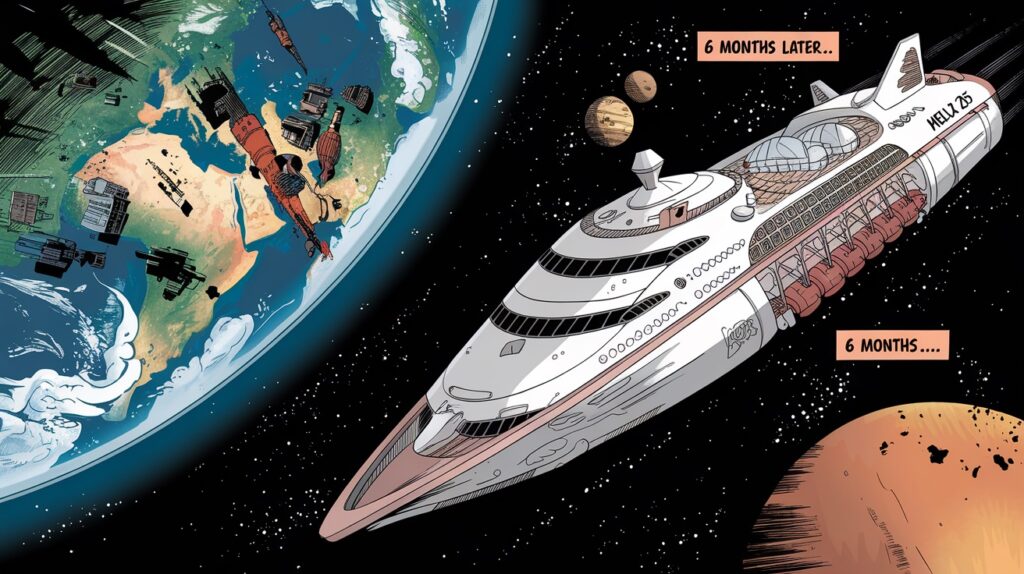 6 months later…
6 months later…